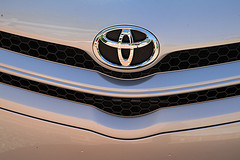 Despite a series of Toyota recalls in the United States in 2009 and 2010 that damaged the Toyota brand (a brand which had long been associated with quality and reliability), Toyota hung on to take the top spot as the world’s largest auto manufacturer of 2010.
Despite a series of Toyota recalls in the United States in 2009 and 2010 that damaged the Toyota brand (a brand which had long been associated with quality and reliability), Toyota hung on to take the top spot as the world’s largest auto manufacturer of 2010.
However, Toyota spokesman Paul Nolasco claims in an article published on the BBC website that selling the most cars in the world is not as important to the company as boosting profits and being number one in customers’ minds in terms of service and satisfaction.
Quality, service and satisfaction have certainly been Toyota brand promises around the world, and despite the Toyota recalls, the brand still owns the word quality in consumers’ minds. There is simply so much trust and belief in the brand from its loyal followers that even recalls couldn’t keep this brand down. You can’t buy that kind of brand equity — the kind that can keep a brand at the top despite problems that would destroy another brand.
However, as the BBC reports, Toyota sales are still down in the United States in comparison to previous years, and General Motors is pushing hard in the United States and around the world to regain the title of biggest car maker, which it held for 80 years before relinquishing it to Toyota in 2008. All eyes are on Asia, specifically China, where General Motors is having great success. 2010 marked the first year that General Motors sold more cars in China than in the United States.
There is a saying that tells us, “the more things change, the more they stay the same.” I can’t help but think of that phrase as I watch the players in the auto manufacturers’ game of chess move around the board. Who will be the short-term winner? Who will be the long-term winner? Only time will tell.
What do you think? Leave a comment and share your predictions for these brands.
Image: Flickr
Susan Gunelius is the author of 10 marketing, social media, branding, copywriting, and technology books, and she is President & CEO of KeySplash Creative, Inc., a marketing communications company. She also owns Women on Business, an award-wining blog for business women. She is a featured columnist for Entrepreneur.com and Forbes.com, and her marketing-related articles have appeared on websites such as MSNBC.com, BusinessWeek.com, TodayShow.com, and more.
She has over 20 years of experience in the marketing field having spent the first decade of her career directing marketing programs for some of the largest companies in the world, including divisions of AT&T and HSBC. Today, her clients include large and small companies around the world and household brands like Citigroup, Cox Communications, Intuit, and more. Susan is frequently interviewed about marketing and branding by television, radio, print, and online media organizations, and she speaks about these topics at events around the world. You can connect with her on Twitter, Facebook, LinkedIn, or Google+.



As a marketing manager; I have learned a very valuable lesson from Toyota . I was one of those extremely loyal customers who has spent in excess of $250k over my life; and vouched endlessly for the brand. That chapter in my life has closed.
Own a 2007 Tacoma, which has had a recurring and extremely expensive issue with front wheel bearings. I have had 7 wheel bearings in less than 120 000 km. I know of another owner who has installed in excess of 11. The horror stories are numerous.
Did the dealer thing; they were only interested in my issue in so far as it was good business for them ( 500 $ a bearing)
Emailed the company and got blown off.
Well, the lesson that has made me change my brand and take my money else where is: The customer is the most important person in the marketing department.
The customer’s issue should receive action and a resolution. In the customer service process it is very important for the customer to feel that they are genuinely / authentically heard, recognized and appreciated . None of which I received from Toyota.
The next $35K which I will be spending this June will not be with Toyota.